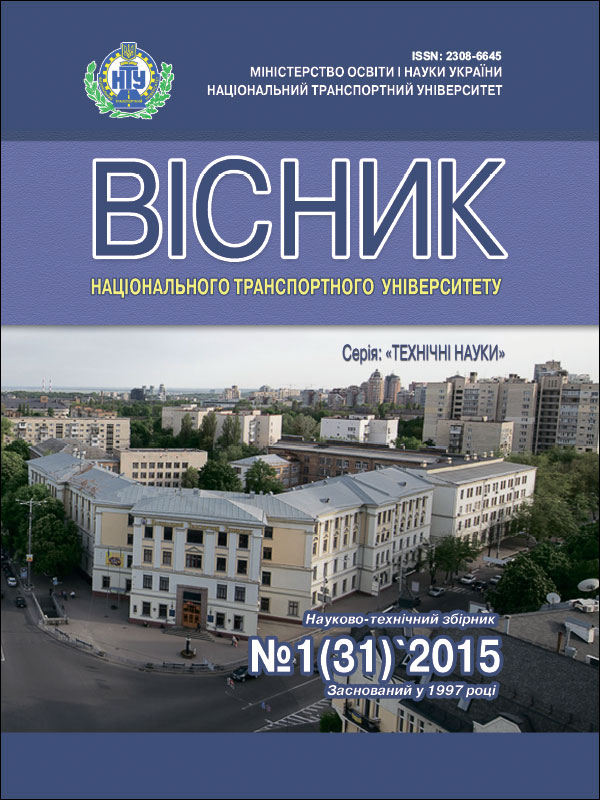MODEL OF MANAGEMENT OF STOCKS UNDER CONDITIONS OF UNCERTAINTY WITH THE USE OF TRADITIONAL CRITERIA
ABSTRACT
Khavruk V.O. Model of management of stocks under conditions of uncertainty with the use of traditional criteria. Visnyk National Transport University. Series «Engineering sciences». Scientific and Technical Collection. - Kyiv: National Transport University, 2020. - Issue 1 (46).
In article it is considered the procedure for the formation of a stock management model in conditions of uncertainty and the development of an appropriate solution based on such traditional criteria as the MM- criterion, the H-criterion, the N-criterion, the S-criterion, the HW-criterion.
Object of research - inventory management system.
Purpose of the study - to study the model of inventory management in conditions of uncertainty and to clarify the basic traditional criteria for making appropriate decisions.
Method of the study - the analysis and formalization: quantitative indicators of reserves, methods of forming a group of events, alternative solutions and calculation of the main traditional criteria for optimizing the model of inventory management under uncertainty.
It is established that the methodology of decision-making under uncertainty presupposes the formalization of the scenario approach. The model of inventory management in conditions of uncertainty consists of the following consecutive stages, such as: 1) the collection of statistical output data (annual consumption of products, overhead for each supply, the price of purchasing a unit of production from suppliers, the selling price of a unit of production); 2) the formation of a complete group of possible events; 3) the formation of a list of alternative solutions under consideration; 4) compiling a utility matrix; 5) choosing the appropriate traditional criterion for making a decision.
It was found out that, in the presence of two alternative suppliers of the same type of products, one of sixteen random events may occur. At the heart of every random event are taken into account such indicators as: annual consumption, unit selling price, consumers' claims on quality. Together, these events constitute a complete group of events.
The utility matrix (the expected annual income) was constructed for sixteen random events based on the annual consumption and the price of sales.
Calculations of traditional criteria for optimizing the inventory management model under conditions of uncertainty are considered and presented.
The application of the inventory management model in conditions of uncertainty and decision-making is substantiated depending on the onset of one of the sixteen events based on such traditional criteria as: MM-criterion, H-criterion, N-criterion, S-criterion, HW-criterion.
The results of the article can be used to improve the efficiency of inventory management by any business entities, in the event that there is a problem of unmet consumer demand.
The forecast assumptions for the development of the research object are the development and refinement of the model of inventory management in the conditions of uncertainty in the presence of three or more alternative suppliers of the same type of products using software products and their introduction into the practical activities of enterprises.
KEYWORDS: INCOME, RESERVE, COEFFICIENT, CRITERIA, MATRIX OF USEFUL, MODEL, EVENT, SUPPLIER, PROFIT, PRODUCTION, SOLUTION, SITUATION, CONSUMPTION, SCENARIO, TARGET FUNCTION.
REFERENCES
- James R. Stock, Duglas M. Lambert (2005). Strategicheskoe upravlenie logistikoy [Strategic Logistics Management]. Moscow, INFRA-M, Publ. [in Russian].
- Sergeev B. I., Belov L. B., Dybskaya V. V., Ivanov V. V., Zaytsev E. I., Sterligova A. N. (2005). Korporativnaya logistika. 300 otvetov na voprosi professionalov [Corporate Logistics 300 answers to the questions of professionals]. Moscow, INFRA-M Publ. [in Russian].
- Eddous, R. Stansfield (1997). Metody prinyatiya resheniy [Methods of Decision Making]. Moscow, AUDIT, UNITY, Audit Publ. [in Russian].
- Mushik E., Muller P. (1990). Metody prinyatiya tekhnicheskikh resheniy [Methods of making technical decisions]. Moscow, Mir Publ. [in Russian].
- Brodetskiy G. L. (2010). Sistemny analiz v logistike [System analysis in logistics. The choice in conditions of uncertainty]. Moscow, Academia Publ. [in Russian].
- Brodetskiy G. L. & Gusev D. A. (2006). Vozmozhnosti optimizatsii modeli upravleniya zapasami v usloviyakh neopredelennosti [Opportunities to optimize the model of inventory management in conditions of uncertainty]. Logistika і upravlenie tsepyami postavok - Logistics and Supply Chain Management, 6( 17), 7485. [in Russian].
- Orlov A. I. (2005). Teoriya prinyatiya resheniy [Decision theory[. Moscow, Ekzamen Publ. [in Russian].
- Rozen V. V. (2002). Matematicheskie modeli prinyatiya resheniy [Mathematical models of decision-making in economics]. Moscow, Universitet Publ. [in Russian].
- Blank I. A. Prinyatiya resheniy v usloviyakh neopredeennosti [Decision-making under risk and
uncertainty: electronic resource]. management.com.ua. Retrieved from
http://www.management.com.ua/qm/qm215.html [in Ukrainian].
- Labsker L. G., Yanovskaya E. V. (2002). Obshchaia metodika konstruirovania kriteriev optimalnosti reshenii v usloviiakh riska i neopredelennosti [General methodology for constructing criteria for optimality of solutions under risk and uncertainty conditions: electronic resource]. Finansovii menedzhment - Financial management, 5, Retrieved from http://www.finman.ru/articles/2002/5/642.html [in Russian].
AUTHOR
Khavruk Volodymir, National Transport University, assistant to chair of technical operation of cars and autoservice, e-mail: khavruk@gmail.com, тє1.+380950187190, Ukraine, 01010, Kyiv, Omelianovycha- Pavlenka str. 1, of. 410.
REVIEWER
Bregida Fedir, Candidate of Science (Engineering), DP «DERGAUTOTRANSNDIPROJECT», Head of Department of research and is standard-legal maintenance in sphere of technical operation of road vehicles, e-mail: to@insat.org.ua, те1.+380442010806, Ukraine, 03113, Kyiv, pr. Peremogy 57, of. 714.
Posviatenko Eduard, Ph.D., Engineering (Dr.), professor, National Transport University, department of manufactures, repair and materials technology, Kyiv, тє1.+380442010806, Ukraine, 01010, Kyiv, Omelianovycha-Pavlenka str. 1, of. 102.
Article language: Ukrainian
Open Access: http://publications.ntu.edu.ua/visnyk/46/375.pdf
Print date: 15.04.2020
Online publication date: 27.10.2020
